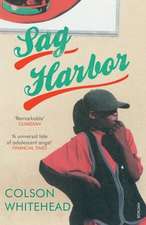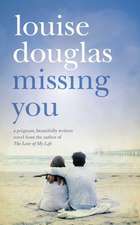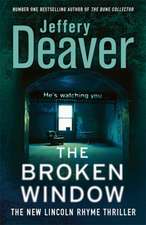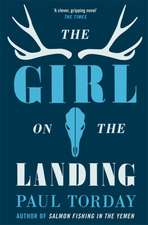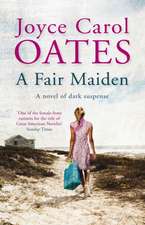Restoration
Autor John Ed Bradleyen Limba Engleză Paperback – 31 mar 2004
A piquantly atmospheric story of race, romance and art, Restoration is provocative, suspenseful and altogether entertaining.
Preț: 103.31 lei
Nou
Puncte Express: 155
Preț estimativ în valută:
19.77€ • 21.54$ • 16.66£
19.77€ • 21.54$ • 16.66£
Carte disponibilă
Livrare economică 02-16 aprilie
Preluare comenzi: 021 569.72.76
Specificații
ISBN-13: 9780385721165
ISBN-10: 0385721161
Pagini: 320
Dimensiuni: 135 x 203 x 20 mm
Greutate: 0.39 kg
Editura: Anchor Books
ISBN-10: 0385721161
Pagini: 320
Dimensiuni: 135 x 203 x 20 mm
Greutate: 0.39 kg
Editura: Anchor Books
Notă biografică
John Ed Bradley is the author of several highly praised novels, including Tupelo Nights and My Juliet. A former staff writer for the Washington Post, Bradley has contributed feature stories to Sports Illustrated, Esquire, and GQ. He lives at historic Coliseum Square in New Orleans’s Lower Garden District.
Extras
ONE
When the old car pulled up, I was waiting by the gate, gazing past a colorful shroud of crape myrtles and wisteria at a plantation house I had long admired. The rent sign hanging from the finials on the tall, iron fence appeared to be hand-done, as the lettering was clumsily formed and running in streaks. YOU CAN LIVE HERE, the sign said, and provided numbers for a local business called High Life Realty.
I cracked a smile at the spectacle of the approaching car. Its exhaust pipe was dragging the ground and shooting sparks in a great, feathery arc. After parking against the curb in front, the driver made a furious attempt to open his door. It wouldn't budge, and so he slid across the seat and got out on the passenger's side. He was an odd-looking fellow with a flaming-red complexion, thinning blond hair and, today, a crust of dried shaving cream on the side of his face. Perhaps because of his company's name, he was not at all what I'd expected. In other words, there was nothing of the high life about him. Cat hair clung to his cheap navy coat. His shoes were brown brogans caked with mud. "You Jack?" he said, ambling toward me with a hand to shake.
"Yes," I answered. "You Mr. Marion?"
"Patrick. Call me Patrick, please." He was the agent representing the rental; I'd phoned him less than an hour before. "It's only eight hundred dollars a month," he said, "but it isn't for the main house, Jack. It's for the bachelor's quarters--the garçonnière--attached to the rear of the building."
"Does someone live in the main house?"
He nodded. "The owner, an elderly man named Lowenstein. I'd offer to introduce you to him but he's not well, I'm afraid. He keeps a maid and a nurse, and if you rent the place you're likely to see more of them than of him. Except for the occasional afternoon when he rolls out for coffee on the back gallery, he tends to remain hidden."
"He's in a wheelchair, then?"
"Well, part of the time, when the arthritis flares up. He doesn't exactly welcome personal questions, but that's how the nurse described his condition."
I followed Patrick to the back of the house and the garconniere. The apartment was small, dark and cramped, and the floors were badly warped from water damage. Ceilings reached upward to a height of twelve feet and each of the three rooms had a fireplace. I checked to make sure the shower worked and the toilet flushed properly, and when I stepped out of the bathroom Patrick was waiting for me with a familiar look on his face. "Jack, have we met before?"
"I don't think so."
"Then how do I know you? I'm certain I've heard your name before."
"You read the paper?"
"Always."
"I'm Jack Charbonnet," I said, pronouncing it the French way, as we do, Shar-bo-nay. "I write a column . . . well, I did write one. I resigned last week."
"And how old are you, Jack? If you don't mind my asking."
"Thirty-two."
"Thirty-two and you've resigned? How wonderful."
"If I look familiar it's probably because the paper ran my mug shot with the column." I imitated my pose in the photo. "Maybe you've seen it."
He pulled a hand down his long face and gave me another look. He shook his head finally, and then pointed to the ground at his feet, no doubt intent on getting back to the issue at hand. "If you want privacy and seclusion, Jack, this is the spot."
"It does inspire, doesn't it? I'm almost embarrassed to admit this, but a moment ago I had a flash of déjà vu."
This seemed to please him, and he answered with an energetic nod. "You're perfect for the place, I can tell. Except for the modern conveniences like plumbing and air-conditioning, it's just as it was in 1830, when the house was built. Maybe you lived here in another life, Jack. Maybe you will live here in many lives to come. In any case, the garden in back is yours to enjoy. Every pink azalea and purple iris, every olive jar, the garden oak and the giant palm . . . even the ghost."
"A ghost, is there?"
"Mr. Lowenstein asked me to make sure to mention it, in the spirit of full disclosure. Unexplained footsteps in the middle of the night, the sound of someone weeping. You get up to see who it is and there's no one. Frankly it strikes me as a bunch of hogwash. But the old man insists it's real." Patrick slapped another hand on my shoulder. "I hope that doesn't kill the deal."
"Not at all. If you live in New Orleans, they can't be avoided, can they?"
"Who's that?"
"Ghosts," I said. "Ghosts and termites. They own this town."
We sat at a small table on the front gallery and he spread out a collection of papers in front of me. I began filling out an application form and paused when I came to the question of employment. Patrick raised an eyebrow as I wrote the word Self.
"If you have no job, Jack, how will you pay rent?"
"I've recently come into some money. By way of inheritance. My father left me some assets. My credit history's strong. I assure you I'm a good candidate."
"I ask only because Mr. Lowenstein will want to know."
"Of course," I said.
"I'd just returned to the office from putting my sign up when the phone rang and you asked to have a look."
"Then it really was meant to be," I said.
To finish the paperwork I wrote out a list of references, then Patrick and I walked across Moss Street and stood staring back at the house from the grassy bank of the bayou. The wind was blowing and pink and violet dust from the trees swirled in the dense, sun-bright air. I could see the windows past the second-floor gallery, in one a lamp glowing against the counterpane.
"Mr. Lowenstein collects paintings," Patrick said. "Has them scattered all over the house, from floor to ceiling in some rooms. He's a bachelor, never married. Probably gay. Or he was gay when he was younger and that sort of thing mattered."
"You mean when sex mattered?"
"Yes, Jack, I do mean sex." He touched my shoulder again. "But back to the paintings. It might interest you to know that Lowenstein even owns some landscapes by that fellow Drysdale." Patrick pronounced the artist's name this way: Driz-dul. "You'll have to get him to show you sometime," he said.
"Drysdale," I repeated.
"Maybe you've seen the stuff. He painted oak trees and Louisiana bayou scenes, most dating to the early part of the century. People today pay bloody fortunes for them. I was never one for the primordial--my idea of camping out, you understand, is staying at a Holiday Inn on the edge of the woods--but these Drysdales are kind of inviting if you're only having to look."
Patrick was quiet as he inspected me once again. Immediately after scheduling the appointment, I'd shaved my face and trimmed back my sideburns, I'd combed the curtain of hair out of my eyes, and I'd put on freshly laundered clothes, a gray tweed jacket, and my best shoes, with socks. Still in all, Patrick seemed keen to my fakery. He saw past the shine. For a second I thought for sure he'd dismiss me as a rental candidate, but then a smile came to his face and he nudged me with an elbow. "I don't mean to be presumptuous," he said, "but are you a Chambers man, Jack?"
"A Chambers man?" I had never heard of such a person.
"I'm referring to the stove, built by Chambers. Mine dates to '29 and is the rarest of all colors." He seemed to be waiting for me to say it. "That's right, a red one. We Chambers men must stick together, Jack. Remember that."
How do you respond to such an assessment of yourself? In the past people had judged me to be many things but never this: I was a Chambers man, of all things.
"Chambers men have little use for the present," Patrick explained. "The past is where their hearts reside. They are smitten with cobwebs and dust. Consequently they spend a lot of time gathered around the stove, and on barstools."
"Patrick, would you like to join me for a cocktail?"
"See there," he answered. "I knew I'd read you right."
We returned to the house a couple of hours later, as dusk was settling in, and Patrick, still pitching the place, offered another look at the rear garden and garconniere.
"Doesn't it just drip with old New Orleans charm?" he said. "It drips, Jack. It absolutely drips . . ." He'd had a few more than I had, but it didn't show in how he carried himself. I was impressed by the fluidity of his movements, all the more so because I found it necessary to touch trees and statuary to maintain balance.
"I'm having guests over Friday night for supper," he said. "It promises to be great fun. I hope you'll join us. You'll meet a nice lady or two. Better still, you'll have a chance to see the Chambers in action."
We'd already got halfway drunk together. I could think of no reason to decline. "Shall I bring anything?" I said.
He seemed to think about it. "Dreams," he said. "Bring your dreams, Jack. And if you know how to make one, a nice big Jell-O salad. I'm crazy for the stuff."
We sat on the garden bench and watched the house for a while, then Patrick walked up to the back door and rapped on it with a fist. I was standing next to him. When Lowenstein failed to answer, we moved to the very rear of the property. Here we could see the place more clearly and observe the full length of the upper windows as well as the lower ones.
I put my hands around my mouth and called out Lowenstein's name--I shouted it repeatedly--and at last he showed himself, his seated form pausing at a window downstairs. He came up out of his chair and stood gazing at us. I lifted a hand and waved, but he offered no response. I thought it only polite that I introduce myself--we soon would be sharing the property, after all--but when I started walking in his direction he dropped back into the chair and vanished just as suddenly as he'd appeared.
"Ghosts," Patrick said bitterly, as if we'd just seen one.
I'd learned many things during my time at the paper, none more important than the importance of keeping people's secrets. It was a rule that extended to my own interests. The truth was, I could recognize the hand of A. J. Drysdale long before Patrick Marion told me how to pronounce his name, having grown up in a home crowded with paintings by the artist. My father had been a collector, chasing antique pictures of the bayou the way other men chase Bourbon Street strippers and sure bets at the Fair Grounds. Drysdale was Louisiana's answer to Claude Monet, his oil washes possessing the same ethereal, haunting quality as the French Impressionist's portraits of lily ponds and flower gardens, but his prices being considerably more affordable. Dad found his at garage sales, junk shops, flea markets and consignment stores, rarely paying more than twenty dollars for a picture. At the time of his death he owned twenty-three Drysdales, one image barely distinguishable from the next, as well as twenty or so other paintings by long-dead Louisiana artists. After we buried him my mother found it difficult to live with the paintings, just as she found it impossible to open the armoire in their bedroom and keep from sobbing at the sight of his clothes still neatly hanging. On a Friday morning I loaded my car with Dad's clothes and donated them to the Saint Vincent de Paul thrift store on Jefferson Highway. In the afternoon I consigned his paintings to the New Orleans Auction Galleries on Julia Street. It hurt me to let the paintings go, knowing how he'd loved them, and the weekend when they came on the block neither Mom nor I were on hand to watch them being sold.
Although Dad famously steered clear of auctions, in the end he would've been pleased with the results of the sale. The John Francis Charbonnet Collection, assembled over thirty years of picking through junk, netted his family nearly $200,000. I offered the entire sum to my mother, but she insisted we split the money. As I was waiting in line at the bank to deposit my share, it came to me that every story I'd ever written had been for the old man. And if they were all for him, I wondered, then who would I write for now? When I arrived at the office later that morning I found my editor outside, where she was permitted to smoke. "I'm quitting," I said.
"You're not quitting shit, Jack," said Isabel Green, then flicked ashes at me.
"I'm telling you I quit, Isabel."
"Jack?"
"I'm going," I told her.
"You can't leave me like this. Jack? Jack, you bastard, come back here."
I saw her cigarette fly past my head. "Too late," I said.
I'd given ten years to the job, and I frankly was tired of words--tired of speaking them and having them spoken to me, but also tired of writing them. My fatigue had intensified during my father's long ordeal with lung cancer. I'd sit by his bed and read newspaper stories to him. My column appeared three days a week, and they were always the toughest to get out of my mouth. I wondered why he didn't grab me by the throat and rip out my voice box. "How do you tolerate such torture?" I asked him one day. The only good thing about Dad's dying--for both of us--was the end of my lousy readings.
I don't claim to be the first of my generation to face the crisis of professional burnout before he'd succeeded in paying off his college loans, not to mention finding a wife and buying a home. But I probably differed from most quitters in that I was leaving at the top of my game. Giving it up when you still have some good years ahead isn't a concept that most people would dare apply to their own experience. Readers mailed in letters to the editor pleading with me to stay. My friends said I was being stupid. To judge from their reactions, one might've thought I'd publicly torched a winning lottery ticket. My last column appeared under the heading "To Your Own Self Be True," and it basically was a finger shot at those who would keep me employed. I might've been the paper's "award-winning humor columnist," as my obit was certain to read one day, but I couldn't remember the last time I had any fun at the job. More than anything I longed for the freedom of observing a day without having to reduce my observations to eighteen column inches of wit and jocularity. I'd had it with wit and jocularity.
When the old car pulled up, I was waiting by the gate, gazing past a colorful shroud of crape myrtles and wisteria at a plantation house I had long admired. The rent sign hanging from the finials on the tall, iron fence appeared to be hand-done, as the lettering was clumsily formed and running in streaks. YOU CAN LIVE HERE, the sign said, and provided numbers for a local business called High Life Realty.
I cracked a smile at the spectacle of the approaching car. Its exhaust pipe was dragging the ground and shooting sparks in a great, feathery arc. After parking against the curb in front, the driver made a furious attempt to open his door. It wouldn't budge, and so he slid across the seat and got out on the passenger's side. He was an odd-looking fellow with a flaming-red complexion, thinning blond hair and, today, a crust of dried shaving cream on the side of his face. Perhaps because of his company's name, he was not at all what I'd expected. In other words, there was nothing of the high life about him. Cat hair clung to his cheap navy coat. His shoes were brown brogans caked with mud. "You Jack?" he said, ambling toward me with a hand to shake.
"Yes," I answered. "You Mr. Marion?"
"Patrick. Call me Patrick, please." He was the agent representing the rental; I'd phoned him less than an hour before. "It's only eight hundred dollars a month," he said, "but it isn't for the main house, Jack. It's for the bachelor's quarters--the garçonnière--attached to the rear of the building."
"Does someone live in the main house?"
He nodded. "The owner, an elderly man named Lowenstein. I'd offer to introduce you to him but he's not well, I'm afraid. He keeps a maid and a nurse, and if you rent the place you're likely to see more of them than of him. Except for the occasional afternoon when he rolls out for coffee on the back gallery, he tends to remain hidden."
"He's in a wheelchair, then?"
"Well, part of the time, when the arthritis flares up. He doesn't exactly welcome personal questions, but that's how the nurse described his condition."
I followed Patrick to the back of the house and the garconniere. The apartment was small, dark and cramped, and the floors were badly warped from water damage. Ceilings reached upward to a height of twelve feet and each of the three rooms had a fireplace. I checked to make sure the shower worked and the toilet flushed properly, and when I stepped out of the bathroom Patrick was waiting for me with a familiar look on his face. "Jack, have we met before?"
"I don't think so."
"Then how do I know you? I'm certain I've heard your name before."
"You read the paper?"
"Always."
"I'm Jack Charbonnet," I said, pronouncing it the French way, as we do, Shar-bo-nay. "I write a column . . . well, I did write one. I resigned last week."
"And how old are you, Jack? If you don't mind my asking."
"Thirty-two."
"Thirty-two and you've resigned? How wonderful."
"If I look familiar it's probably because the paper ran my mug shot with the column." I imitated my pose in the photo. "Maybe you've seen it."
He pulled a hand down his long face and gave me another look. He shook his head finally, and then pointed to the ground at his feet, no doubt intent on getting back to the issue at hand. "If you want privacy and seclusion, Jack, this is the spot."
"It does inspire, doesn't it? I'm almost embarrassed to admit this, but a moment ago I had a flash of déjà vu."
This seemed to please him, and he answered with an energetic nod. "You're perfect for the place, I can tell. Except for the modern conveniences like plumbing and air-conditioning, it's just as it was in 1830, when the house was built. Maybe you lived here in another life, Jack. Maybe you will live here in many lives to come. In any case, the garden in back is yours to enjoy. Every pink azalea and purple iris, every olive jar, the garden oak and the giant palm . . . even the ghost."
"A ghost, is there?"
"Mr. Lowenstein asked me to make sure to mention it, in the spirit of full disclosure. Unexplained footsteps in the middle of the night, the sound of someone weeping. You get up to see who it is and there's no one. Frankly it strikes me as a bunch of hogwash. But the old man insists it's real." Patrick slapped another hand on my shoulder. "I hope that doesn't kill the deal."
"Not at all. If you live in New Orleans, they can't be avoided, can they?"
"Who's that?"
"Ghosts," I said. "Ghosts and termites. They own this town."
We sat at a small table on the front gallery and he spread out a collection of papers in front of me. I began filling out an application form and paused when I came to the question of employment. Patrick raised an eyebrow as I wrote the word Self.
"If you have no job, Jack, how will you pay rent?"
"I've recently come into some money. By way of inheritance. My father left me some assets. My credit history's strong. I assure you I'm a good candidate."
"I ask only because Mr. Lowenstein will want to know."
"Of course," I said.
"I'd just returned to the office from putting my sign up when the phone rang and you asked to have a look."
"Then it really was meant to be," I said.
To finish the paperwork I wrote out a list of references, then Patrick and I walked across Moss Street and stood staring back at the house from the grassy bank of the bayou. The wind was blowing and pink and violet dust from the trees swirled in the dense, sun-bright air. I could see the windows past the second-floor gallery, in one a lamp glowing against the counterpane.
"Mr. Lowenstein collects paintings," Patrick said. "Has them scattered all over the house, from floor to ceiling in some rooms. He's a bachelor, never married. Probably gay. Or he was gay when he was younger and that sort of thing mattered."
"You mean when sex mattered?"
"Yes, Jack, I do mean sex." He touched my shoulder again. "But back to the paintings. It might interest you to know that Lowenstein even owns some landscapes by that fellow Drysdale." Patrick pronounced the artist's name this way: Driz-dul. "You'll have to get him to show you sometime," he said.
"Drysdale," I repeated.
"Maybe you've seen the stuff. He painted oak trees and Louisiana bayou scenes, most dating to the early part of the century. People today pay bloody fortunes for them. I was never one for the primordial--my idea of camping out, you understand, is staying at a Holiday Inn on the edge of the woods--but these Drysdales are kind of inviting if you're only having to look."
Patrick was quiet as he inspected me once again. Immediately after scheduling the appointment, I'd shaved my face and trimmed back my sideburns, I'd combed the curtain of hair out of my eyes, and I'd put on freshly laundered clothes, a gray tweed jacket, and my best shoes, with socks. Still in all, Patrick seemed keen to my fakery. He saw past the shine. For a second I thought for sure he'd dismiss me as a rental candidate, but then a smile came to his face and he nudged me with an elbow. "I don't mean to be presumptuous," he said, "but are you a Chambers man, Jack?"
"A Chambers man?" I had never heard of such a person.
"I'm referring to the stove, built by Chambers. Mine dates to '29 and is the rarest of all colors." He seemed to be waiting for me to say it. "That's right, a red one. We Chambers men must stick together, Jack. Remember that."
How do you respond to such an assessment of yourself? In the past people had judged me to be many things but never this: I was a Chambers man, of all things.
"Chambers men have little use for the present," Patrick explained. "The past is where their hearts reside. They are smitten with cobwebs and dust. Consequently they spend a lot of time gathered around the stove, and on barstools."
"Patrick, would you like to join me for a cocktail?"
"See there," he answered. "I knew I'd read you right."
We returned to the house a couple of hours later, as dusk was settling in, and Patrick, still pitching the place, offered another look at the rear garden and garconniere.
"Doesn't it just drip with old New Orleans charm?" he said. "It drips, Jack. It absolutely drips . . ." He'd had a few more than I had, but it didn't show in how he carried himself. I was impressed by the fluidity of his movements, all the more so because I found it necessary to touch trees and statuary to maintain balance.
"I'm having guests over Friday night for supper," he said. "It promises to be great fun. I hope you'll join us. You'll meet a nice lady or two. Better still, you'll have a chance to see the Chambers in action."
We'd already got halfway drunk together. I could think of no reason to decline. "Shall I bring anything?" I said.
He seemed to think about it. "Dreams," he said. "Bring your dreams, Jack. And if you know how to make one, a nice big Jell-O salad. I'm crazy for the stuff."
We sat on the garden bench and watched the house for a while, then Patrick walked up to the back door and rapped on it with a fist. I was standing next to him. When Lowenstein failed to answer, we moved to the very rear of the property. Here we could see the place more clearly and observe the full length of the upper windows as well as the lower ones.
I put my hands around my mouth and called out Lowenstein's name--I shouted it repeatedly--and at last he showed himself, his seated form pausing at a window downstairs. He came up out of his chair and stood gazing at us. I lifted a hand and waved, but he offered no response. I thought it only polite that I introduce myself--we soon would be sharing the property, after all--but when I started walking in his direction he dropped back into the chair and vanished just as suddenly as he'd appeared.
"Ghosts," Patrick said bitterly, as if we'd just seen one.
I'd learned many things during my time at the paper, none more important than the importance of keeping people's secrets. It was a rule that extended to my own interests. The truth was, I could recognize the hand of A. J. Drysdale long before Patrick Marion told me how to pronounce his name, having grown up in a home crowded with paintings by the artist. My father had been a collector, chasing antique pictures of the bayou the way other men chase Bourbon Street strippers and sure bets at the Fair Grounds. Drysdale was Louisiana's answer to Claude Monet, his oil washes possessing the same ethereal, haunting quality as the French Impressionist's portraits of lily ponds and flower gardens, but his prices being considerably more affordable. Dad found his at garage sales, junk shops, flea markets and consignment stores, rarely paying more than twenty dollars for a picture. At the time of his death he owned twenty-three Drysdales, one image barely distinguishable from the next, as well as twenty or so other paintings by long-dead Louisiana artists. After we buried him my mother found it difficult to live with the paintings, just as she found it impossible to open the armoire in their bedroom and keep from sobbing at the sight of his clothes still neatly hanging. On a Friday morning I loaded my car with Dad's clothes and donated them to the Saint Vincent de Paul thrift store on Jefferson Highway. In the afternoon I consigned his paintings to the New Orleans Auction Galleries on Julia Street. It hurt me to let the paintings go, knowing how he'd loved them, and the weekend when they came on the block neither Mom nor I were on hand to watch them being sold.
Although Dad famously steered clear of auctions, in the end he would've been pleased with the results of the sale. The John Francis Charbonnet Collection, assembled over thirty years of picking through junk, netted his family nearly $200,000. I offered the entire sum to my mother, but she insisted we split the money. As I was waiting in line at the bank to deposit my share, it came to me that every story I'd ever written had been for the old man. And if they were all for him, I wondered, then who would I write for now? When I arrived at the office later that morning I found my editor outside, where she was permitted to smoke. "I'm quitting," I said.
"You're not quitting shit, Jack," said Isabel Green, then flicked ashes at me.
"I'm telling you I quit, Isabel."
"Jack?"
"I'm going," I told her.
"You can't leave me like this. Jack? Jack, you bastard, come back here."
I saw her cigarette fly past my head. "Too late," I said.
I'd given ten years to the job, and I frankly was tired of words--tired of speaking them and having them spoken to me, but also tired of writing them. My fatigue had intensified during my father's long ordeal with lung cancer. I'd sit by his bed and read newspaper stories to him. My column appeared three days a week, and they were always the toughest to get out of my mouth. I wondered why he didn't grab me by the throat and rip out my voice box. "How do you tolerate such torture?" I asked him one day. The only good thing about Dad's dying--for both of us--was the end of my lousy readings.
I don't claim to be the first of my generation to face the crisis of professional burnout before he'd succeeded in paying off his college loans, not to mention finding a wife and buying a home. But I probably differed from most quitters in that I was leaving at the top of my game. Giving it up when you still have some good years ahead isn't a concept that most people would dare apply to their own experience. Readers mailed in letters to the editor pleading with me to stay. My friends said I was being stupid. To judge from their reactions, one might've thought I'd publicly torched a winning lottery ticket. My last column appeared under the heading "To Your Own Self Be True," and it basically was a finger shot at those who would keep me employed. I might've been the paper's "award-winning humor columnist," as my obit was certain to read one day, but I couldn't remember the last time I had any fun at the job. More than anything I longed for the freedom of observing a day without having to reduce my observations to eighteen column inches of wit and jocularity. I'd had it with wit and jocularity.
Recenzii
"Deftly mixes history, mystery and a little romance with serious questions of race and identity. . . . Entertaining . . . . Provocative and illuminating." --The Philadelphia Inquirer
Compelling, complex characters doing interesting things while working through important emotional and philosophical issues—this is the stuff of genuine literature. . . . The narrative flows rich and smooth as chicory coffee at a Vieux Carre café.” --Booklist
“[M]asterfully ties together fact and fiction, imagined artists and real, to create an understanding of Southern art in the 1930s and 1940s, and the society that art reflects.” --Richmond Times-Dispatch
“Mr. Bradley brings clarity and a measured lyricism to the writing of fiction.” --The New York Times Book Review
Compelling, complex characters doing interesting things while working through important emotional and philosophical issues—this is the stuff of genuine literature. . . . The narrative flows rich and smooth as chicory coffee at a Vieux Carre café.” --Booklist
“[M]asterfully ties together fact and fiction, imagined artists and real, to create an understanding of Southern art in the 1930s and 1940s, and the society that art reflects.” --Richmond Times-Dispatch
“Mr. Bradley brings clarity and a measured lyricism to the writing of fiction.” --The New York Times Book Review


